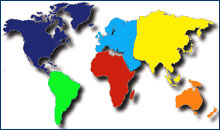The rain in Spain falls mainly in October
What the weather is like in Europe from season to season
Like Jimmy Buffet says, "The weather is here; I wish you were beautiful."
I'm not shattering any illusions by saying that the climate in Europe can vary dramatically from country to country (this is, after all, a continent that contains both Greek Islands and Norwegian fjords), and temps can fluctuate wildly even within a season. That said, although you may find the odd summer cold snap in Scotland or a balmy Sicilian day in December, Europe for the most part holds few seasonal surprises.
The weather is fairly similar to that of the northeastern United States or middle Midwest (ie: not North Dakota). It (occasionally) snows on Greek islands in winter, and summer brings out the shorts in Scandinavia.
On a similar note, February means weeks of subzero temperatures in the northerly reaches of Great Britain and Finland, and it can broil beyond 120°F in southern Italy and Spain in August. Actually, in August of 2003 temperatures topped 100°F all across Europe—even the UK. University of Bern researchers declared it to have been the hottest summer in 500 years (no, seriously).
Weather Resources
Weather.com (www.weather.com) - The Weather Channel still be pinching itself over snapping up the perfect domain name for its industry. The whole homepage is US-centric. Click on the "World" tab in the menu across the top to start hunting down the local reports for the places you’d like to go.
Intellicast (www.intellicast.com) - International travel page on the sister company to weather.com, with links to forecasts by country and city.
Eurometeo (www.eurometeo.com) - Italy-based site, but available in English and with plenty of up-to-date info about Europe at large (though, yes, still mostly about Italy).
Meteofrance (www.meteofrance.com) - French weather site so you can find out quand il pleaut en France. (And it you didn't understand that, you're out of luck, 'cause the site's in French only.)
In a single summer, Europe's mountain glaciers melted to the tune of 10%, bringing the total glacial mass loss over the past century to a staggering 50%. (And they try to tell us there's no such thing as global warming.) The most conservative estimate of the death toll I saw said 19,000; other studies pegged the number as high as 35,000.
Aside from setting such grisly records—including the first triple-digit (Fahrenheit) temps ever registered in London—summer 2003 proved, from a tourism point of view, a turning point for comfort levels: hotels in most nations finally capitulated and start installing air conditioners en masse.
However, that freakishly hot summer aside, when compared to the United States (disregarding the Pacific Northwest), Europe tends to be slightly wetter in spring, autumn, and winter and (if you don't count the Southwest) drier in summer.
Yes, the glacier-bound peaks of Switzerland never free themselves entirely from the snow, and it does tend to rain an awful lot in England—not all the time, and not usually in downpours; just that it is more often misty and drizzly there than here (so long as "here" for you doesn't mean Seattle, in which case you'll feel right at home in London).
Basically, you should prepare for all possible vagaries of the weather. Bring a folding pocket umbrella, long underwear (if its fall to spring and you're in a northerly clime), clothes to layer, and lightweight togs for when it gets warm.
Related Articles |
Outside Resources |
This article was last updated in August 2007. All information was accurate at the time.
Copyright © 1998–2010 by Reid Bramblett. Author: Reid Bramblett.



 ShareThis
ShareThis

